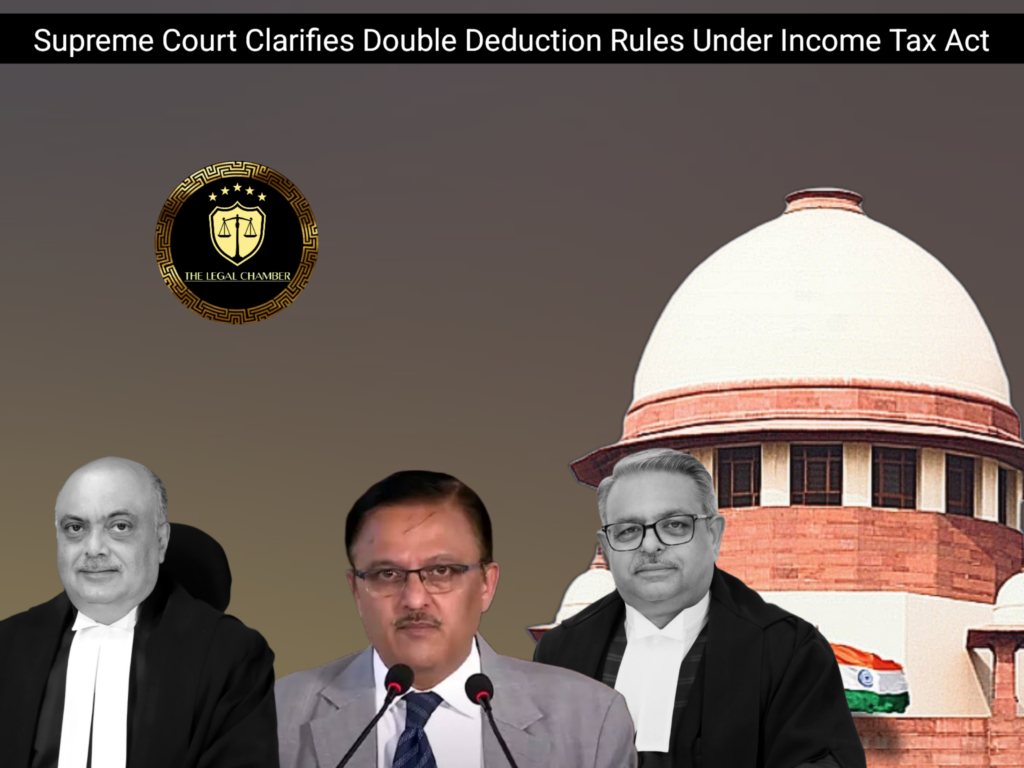
The Supreme Court ruled that Section 80-IA(9) of the Income Tax Act, 1961, bars double deductions on the same profits under both Sections 80-IA and 80-HHC. It held that while deductions can be computed separately under different provisions, the total deduction cannot exceed the eligible profits of the business. The Court upheld the Bombay High Court’s interpretation, clarifying that Section 80-IA(9) restricts the allowability—not computation—of deductions, ensuring taxpayers do not claim overlapping benefits under Chapter VI-A.
Facts Of The Case:
The case involved Shital Fibers Limited, which filed its income tax return for the Assessment Year 2002-03, declaring a taxable income of ₹46,99,293 and claiming deductions under Sections 80-HHC (export profits) and 80-IA (industrial undertakings). The return was initially accepted, but the Revenue Department later initiated reassessment proceedings under Section 147 of the Income Tax Act, citing the ITAT Special Bench ruling in ACTT v. Rogini Garments. The department contended that the appellant had wrongly claimed overlapping deductions on the same profits.
The Assessing Officer disallowed the deductions, a decision upheld by the CIT(A), ITAT, and Punjab & Haryana High Court, which relied on its earlier judgment in Friends Castings (P) Ltd. v. CIT. The High Court ruled that Section 80-IA(9) prohibits dual deductions under Chapter VI-A if a deduction has already been allowed under Section 80-IA/80-IB. The appellant argued that Section 80-IA(9) only restricts the allowability, not computation, of deductions, citing the Bombay High Court’s contrary view in Associated Capsules (P) Ltd. v. DCIT. The Supreme Court, in its judgment, resolved the conflict by upholding the Bombay High Court’s interpretation, clarifying that while deductions under different provisions can be computed separately, the total deduction cannot exceed the profits of the business. The Court emphasized that Section 80-IA(9) prevents double benefits but does not alter the computation mechanism under other provisions.
Procedural History:
The case originated when Shital Fibers Limited filed its income tax return for Assessment Year 2002-03, claiming deductions under Sections 80-HHC and 80-IA. The Assessing Officer (AO) initially accepted the return under Section 143(1)(a) but later initiated reassessment proceedings under Section 147, relying on the ITAT Special Bench ruling in ACTT v. Rogini Garments. The AO disallowed the deductions, holding that Section 80-IA(9) barred double benefits on the same profits.
The appellant appealed to the Commissioner of Income Tax (Appeals) [CIT(A)], which upheld the AO’s decision. The Income Tax Appellate Tribunal (ITAT) also dismissed the appeal, agreeing with the Revenue’s interpretation of Section 80-IA(9). The Punjab & Haryana High Court, in its impugned judgment, affirmed the ITAT’s ruling, relying on its earlier decision in Friends Castings (P) Ltd. v. CIT and rejecting the Bombay High Court’s contrary view in Associated Capsules (P) Ltd. v. DCIT.
The Supreme Court took up the matter due to a conflict between High Courts and a split opinion in ACIT v. Micro Labs Ltd.. A three-judge bench was constituted to resolve the issue. The Court upheld the Bombay High Court’s interpretation, clarifying that Section 80-IA(9) restricts overlapping deductions but does not alter the computation process. The case was remanded to the regular bench for final disposal in light of this ruling.
READ ALSO : Govt Employee Loses Promotion Battle: Supreme Court Upholds Downgraded Designation After 40 Years
Court Observation:
The Supreme Court made several key observations while interpreting Section 80-IA(9) of the Income Tax Act, 1961. The Court emphasized that the provision does not prohibit the computation of deductions under different sections of Chapter VI-A, but rather restricts their cumulative allowability. It clarified that while an assessee may calculate deductions separately under Sections 80-HHC and 80-IA, the total deduction cannot exceed the profits of the eligible business.
The Bench approved the Bombay High Court’s view in Associated Capsules, which distinguished between computation and allowability of deductions. It observed that Section 80-IA(9) operates at the stage of granting deductions, not while computing them. The Court rejected the interpretation that required reducing gross total income by deductions already allowed under Section 80-IA before computing other deductions, noting this would lead to illogical and unworkable results.
Significantly, the Court highlighted that the legislative intent behind Section 80-IA(9) was to prevent double benefits on the same profits, not to deny legitimate claims under different provisions. It stressed that the formula-based computation under Section 80-HHC must remain undisturbed, with the restriction applying only to the final aggregation of deductions. The judgment harmonizes the scheme of Chapter VI-A by allowing separate computation while capping total deductions at 100% of eligible profits.
Final Decision & Judgement:
The Supreme Court, in its final judgment, upheld the Bombay High Court’s interpretation and ruled that Section 80-IA(9) of the Income Tax Act, 1961, does not prohibit the computation of deductions under multiple provisions of Chapter VI-A (such as Sections 80-HHC and 80-IA), but restricts their cumulative allowability to ensure the total deduction does not exceed the profits of the eligible business. The Court clarified that while assessees may separately compute deductions under different sections, the final claim cannot exceed 100% of the profits, thereby preventing double benefits on the same income.
The Bench rejected the Revenue’s argument that deductions under Section 80-IA must first be subtracted from gross total income before computing other deductions, holding that such an approach would distort statutory formulas and produce illogical outcomes. Instead, the Court affirmed that Section 80-IA(9) operates only at the stage of granting deductions, ensuring fairness while preserving legislative intent. The judgment resolved conflicting High Court rulings and provided clarity on the interplay between deductions under Chapter VI-A, reinforcing that taxpayers cannot claim overlapping benefits beyond the actual profits earned. The case was remanded for final disposal in line with these principles.
Case Details:
Case Title:Shital Fibers Limited vs. Commissioner of Income Tax Citation:(2025) INSC 743 Appeal Number:Civil Appeal No. 14318 of 2015 Date of Judgment:20th May, 2025 Bench: Justice Abhay S. Oka & Justice Ahsanuddin Amanullah & Justice Augustine George Masih
Download The Judgement Here